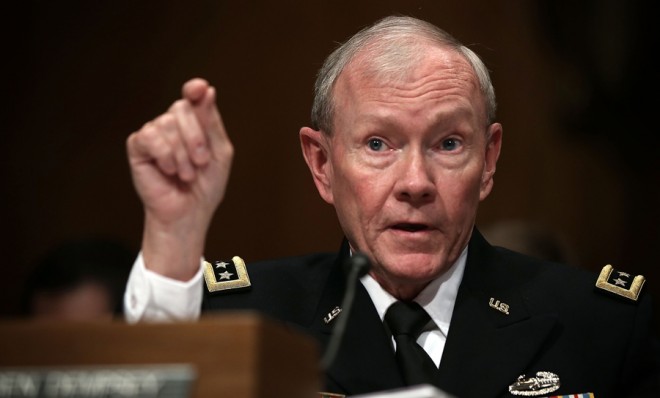Obama has a very short list of viable military options in Syria
One widely discussed plan "would not be militarily decisive, but it would commit us decisively to the conflict," warns Gen. Martin Dempsey


A free daily email with the biggest news stories of the day – and the best features from TheWeek.com
You are now subscribed
Your newsletter sign-up was successful
President Obama acknowledged to CNN on Friday that this week's alleged chemical-weapons massacre in Syria could speed up the timetable for an escalated response to the country's mushrooming violence, but he said he would not rush to get America involved in a costly new war.
The latest violence in Syria has prompted a high-stakes debate in the Obama administration over U.S. military options, The New York Times reported. After all, if confirmed, President Bashar al-Assad's poison gas attack would be the most blatant violation yet of what Obama has called a "red line" that Syrian forces must not cross.
In a White House meeting on Thursday, representatives from the Pentagon, State Department, and intelligence agencies were reportedly sharply divided. Some senior officials argued that any military response would be reckless, while others argued that Obama must send Assad a powerful message if the attack is verified, according to the Times.
The Week
Escape your echo chamber. Get the facts behind the news, plus analysis from multiple perspectives.

Sign up for The Week's Free Newsletters
From our morning news briefing to a weekly Good News Newsletter, get the best of The Week delivered directly to your inbox.
From our morning news briefing to a weekly Good News Newsletter, get the best of The Week delivered directly to your inbox.
The mildest military option would be simply to speed up a move Obama has already approved — increasing American aid to the Syrians who are already fighting Assad. At the very least, says Juan Cole at Informed Comment, this alleged atrocity "will increase pressure on a reluctant Obama to speed up promised shipments of weapons to the rebels."
After the horrific images that emerged out of Syria this week, however, many people are calling for a much stronger response. The next level of intensity might be launching a volley of cruise missiles at Syrian military targets. Such a campaign, proponents say, could be brief, but would convey an unmistakable warning to Assad. French Foreign Minister Laurent Fabius appeared to be suggesting that something like that — stopping short of sending in ground troops — might be necessary if the United Nations Security Council fails to act.
But that's still not enough for some people. Here's Ed Morrissey at Hot Air:
Shooting a cruise missile to hit an army barracks might sound like a big rebuke to Assad, but it's not going to change the calculus of the war. In fact, it won't even change the calculus of the use of chemical weapons, by either side. A momentary attack with no follow-up will only allow Western leaders to convince themselves that they've done something, even though they will have done nothing at all. [Hot Air]
Then, of course, there is the Libya model — using missiles and fighter jets to neutralize Assad's air force. The Washington Post said in an editorial that the U.S. should promptly find out what happened, and, if Assad's forces did what the rebels say they did, "Obama should deliver on his vow not to tolerate such crimes — by ordering direct U.S. retaliation against the Syrian military forces responsible and by adopting a plan to protect civilians in southern Syria with a no-fly zone."
A free daily email with the biggest news stories of the day – and the best features from TheWeek.com
One problem with all of the above: Gen. Martin Dempsey, chairman of the Joint Chiefs of Staff, wrote this week in a letter to a congressman that none of these actions would make a difference in Syria's "deeply rooted" conflict. "The loss of Assad's air force would negate his ability to attack opposition forces from the air," Dempsey wrote, "but it would also escalate and potentially further commit the United States to the conflict. Stated another way, it would not be militarily decisive, but it would commit us decisively to the conflict."
The danger that any military response could backfire is a common refrain, of course, among those who think the best option is doing nothing. Paul Thomas Chamberlin at The Christian Science Monitor lists a host of examples — from Jimmy Carter's and Ronald Reagan's arming of the Afghan Mujahideen against the Soviet Union in the 1980s, to Reagan's 1982 humanitarian intervention in Lebanon's civil war — to illustrate that our best intentions can wind up compounding problems instead of solving them.
No one can dispute that what is happening in Syria is a tragedy, and it is easy to sympathize with the argument that the U.S. should use its power to stanch the bleeding. But the historical record of American interventions in the region gives little cause for optimism. In one case after another, the intervention of American forces has exacerbated local conflicts rather than resolved them. If the Obama administration does indeed choose to venture into Syria, it must do so with extreme caution. [Christian Science Monitor]
Harold Maass is a contributing editor at The Week. He has been writing for The Week since the 2001 debut of the U.S. print edition and served as editor of TheWeek.com when it launched in 2008. Harold started his career as a newspaper reporter in South Florida and Haiti. He has previously worked for a variety of news outlets, including The Miami Herald, ABC News and Fox News, and for several years wrote a daily roundup of financial news for The Week and Yahoo Finance.
